文字难度:★★★☆☆
Herman Rosenblat knew how to tell a story. At family occasions, he was the one who would 2)spin fantastic 3)yarns with only 4)a kernel of truth. One of Herman’s favorite stories was about how he met his wife Roma. He would recount the astonishing tale of how, as an 11-year-old Polish Jew 5)interned by the Nazis in a sub-camp of 6)Buchenwald, he was sustained by a young girl who came each day to throw him apples over the fence. He never knew her name. Twelve years later, Rosenblat was living in New York when a friend set him up on a 7)blind date. In an incredible twist of fate, the curly-haired woman with green eyes who was his date for the evening turned out to be his childhood savior, the girl who had thrown him apples all those years before: his “angel at the fence”. He proposed on the spot, against the twinkling lights of the 8)Coney Island amusement parks. They were married in 1958 and had two children.
赫尔曼•罗森布拉特很会讲故事。在家庭聚会上,他总能给一点小事添油加醋然后编出动人故事。赫尔曼最爱讲的故事之一是他和妻子罗玛的相遇。他会这样讲述那令人惊奇不已的故事:当时,他是个年仅11岁的波兰犹太男孩,被纳粹分子关押在布痕瓦尔德的一个下属集中营。有个小女孩每天都来看他,并从铁丝网外扔苹果给他吃。可他从来不知道她的名字。12年后,罗森布拉特在纽约生活。有一次,一位朋友帮他安排了一次相亲。命运就是这么奇妙,那晚和他约会的那个绿眼睛、卷发女子正是他童年时的救星,那个多年前给他扔苹果的人——他的“铁丝网外的天使”。在科尼岛游乐园闪烁的灯光下,他当场求婚。两人于1958年结婚,之后有了两个孩子。
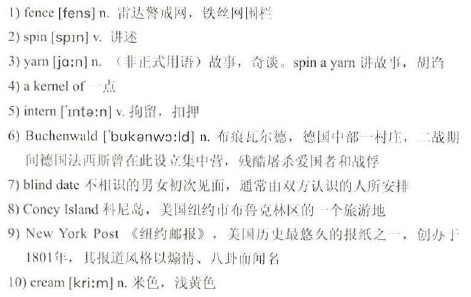
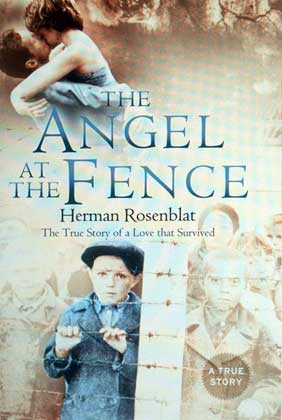 To begin with, it was an anecdote he shared only with friends or new acquaintances. Then, in 1995, Rosenblat wrote it up and entered a newspaper competition to find the best Valentine’s Day-themed short story. He won and his story was featured on the front page of the 9)New York Post. Within months, the Rosenblats were appearing on The Oprah Winfrey Show, sitting hand in hand on a 10)cream sofa, in the full glare of studio lights. In the years that followed, Rosenblat was signed up by a literary agent who 11)brokered a book deal. The Rosenblats began appearing at local schools and Holocaust-education centers, with Herman giving his moving account of how love triumphed over the forces of hatred. He enjoyed the attention. Rosenblat’s memoir, Angel at the Fence, was 12)slated for publication by 13)Berkley Books in 2009. Life was good for the Rosenblats.
To begin with, it was an anecdote he shared only with friends or new acquaintances. Then, in 1995, Rosenblat wrote it up and entered a newspaper competition to find the best Valentine’s Day-themed short story. He won and his story was featured on the front page of the 9)New York Post. Within months, the Rosenblats were appearing on The Oprah Winfrey Show, sitting hand in hand on a 10)cream sofa, in the full glare of studio lights. In the years that followed, Rosenblat was signed up by a literary agent who 11)brokered a book deal. The Rosenblats began appearing at local schools and Holocaust-education centers, with Herman giving his moving account of how love triumphed over the forces of hatred. He enjoyed the attention. Rosenblat’s memoir, Angel at the Fence, was 12)slated for publication by 13)Berkley Books in 2009. Life was good for the Rosenblats.
一开始,这只是跟朋友和初相识的人分享的一段轶事。后来在1995年,罗森布拉特把故事写了下来,参加一份报纸举办的以情人节为主题的短篇故事大赛并获奖。他的这篇文章被刊登在《纽约邮报》的头版。数月后,罗森布拉特夫妇获邀参加《奥普拉•温弗瑞秀》,在演播厅镁光灯的投射和聚焦中,两人手拉手坐在米色沙发上接受采访。之后的几年里,一家文稿代理商和罗森布拉特签约,替他谈妥了一个出书计划。罗森布拉特夫妇还开始到当地的学校和多个大屠杀教育中心演讲,在那里,赫尔曼感人肺腑地讲述爱如何战胜仇恨。他享受众人的关注。柏克利出版公司筹划在2009年出版罗森布拉特的自传《铁丝网外的天使》。罗森布拉特一家的生活曾经是那么的美好。
There was just one problem—it wasn’t true. Although Rosenblat did survive the Holocaust and his marriage to Roma was genuine, the story of a young girl throwing him apples was a 14)fabrication. His “angel at the fence” was a fake.
只是有一个问题——那故事并不真实。虽然罗森布拉特确实是大屠杀幸存者,他和罗玛的婚姻也是真的,但那个小女孩向他扔苹果的段子却是虚构的。他的“铁丝网外的天使”是假的。
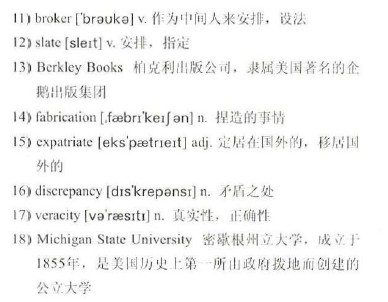
Doubts about the Rosenblat memoir started circulating on the Internet and were mentioned by the eminent Holocaust historian Deborah Lipstadt on her website as early as December 2007. Shortly afterwards, Danny Bloom, a 60-year-old 15)expatriate Jewish American living in Taiwan, picked up on some of the story’s 16)discrepancies and started emailing academic experts asking them to look into the 17)veracity of Rosenblat’s account. One of the academics Bloom emailed was Ken Waltzer, the professor of Jewish studies at 18)Michigan State University. Waltzer, who was writing a book about the children of Buchenwald, had already made his own 19)tentative inquiries into the Rosenblat story.
对于罗森布拉特的这段回忆录,网络早有存疑的声音,而早在2007年12月,研究大屠杀的著名历史学家黛博拉•利普斯塔特就在她的网站上提出了质疑。不久,居住在台湾的60岁美籍犹太人丹尼•布鲁姆收集了罗森布拉特故事中的矛盾之处,并开始给多位学术专家写邮件,请他们查证罗森布拉特所说故事的真实性。肯•沃尔兹是布鲁姆写邮件求助的学者之一,他是密歇根州立大学研究犹太人历史的教授。沃尔兹正在写一本有关布痕瓦尔德集中营孩子的书。而他也早已对罗森布拉特的故事开始其初步的研究核实。
“In November 2008, I was contacted by two 20)forensic 21)genealogists who were investigating the memoir,” he explains. “They were able to give me maps of the Buchenwald sub-camp in 22)Schlieben. We already knew from survivor testimonies that to go to the fence was punishable by death and there was a high risk you would be 23)electrocuted. The maps showed that the only external fence was down by the 24)SS 25)barracks and that civilians had been banned from the road that ran alongside it since 1943 so there was no way that Herman and Roma could have had a 26)rendezvous.”
“2008年11月,两名正在调查罗森布拉特自传的法庭系谱专家联系了我,”他解释说,“他们给了我位于施里本的布痕瓦尔德下属集中营的一些地图。从集中营幸存者的陈述中,我们已经知道,走近铁丝网围栏是会被处死的,而且也很容易被铁丝网电死。地图显示,唯一一段靠外的铁丝网围栏通向纳粹党卫军营地,而自1943年起,铁丝网外沿的公路一直禁止平民进入。因此,赫尔曼和罗玛绝不可能如他们说的那样隔网相遇。”
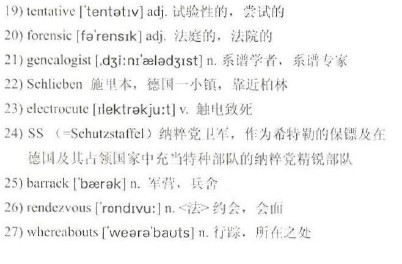
Waltzer and his associates then looked into the matter of Roma’s 27)whereabouts during the Second World War. In his story, Herman had claimed that Roma and her family were Polish Jews living under assumed identities on a nearby farm. There was no trace of them. “The 28)upshot of it all was that the family was some distance away in 29)Brieg,” says Waltzer. “The story was completely untrue. If Roma wasn’t there, then she wasn’t throwing him apples. There are no redemptive endings in the Holocaust. In this case, the dark truth was hidden to spin a story of romance, and that, to me, is a denial of the substance of the Holocaust .”
接下来,沃尔兹和他的同事们开始查证二战期间罗玛的行踪所在。按赫尔曼的版本,他称,罗玛和她的家人是波兰犹太人,当时以虚假的身份居住在附近的一个农场。但一点证据都没有。“最后调查的结果是,罗玛一家当时居住在较远的布瑞格。”沃尔兹说,“这故事完全是假的。如果罗玛不在施里本,那么她也不可能从铁丝网外向他扔苹果。大屠杀的悲剧是不可挽回的。在这件事情上,为了讲述一个浪漫的故事而掩盖了黑暗的事实。在我看来,这是一种对大屠杀实质的否认。”
News of the Rosenblat 30)hoax finally broke last December. Berkley Books swiftly dropped plans to publish his memoir. Rosenblat issued a curiously unapologetic statement claiming that his motivation was “to make good in this world”. “I wanted to bring happiness to people, to remind them not to hate, but to love and tolerate all people,” the statement read. “In my dreams, Roma will always throw me an apple, but I now know it is only a dream.”
 去年12月,罗森布拉特的谎言最终被揭发曝光。柏克利出版公司立即取消了出版其自传的计划。罗森布拉特发表了一份耐人寻味而毫无歉意的声明,宣称他的动机是“给这个世界创造一些美好的东西。”“我希望带给人们快乐,提醒他们不要去憎恨,而是去爱和包容所有的人。”声明中说,“在我的梦里,罗玛将一直扔苹果给我,但我现在知道,这只是个梦。”
去年12月,罗森布拉特的谎言最终被揭发曝光。柏克利出版公司立即取消了出版其自传的计划。罗森布拉特发表了一份耐人寻味而毫无歉意的声明,宣称他的动机是“给这个世界创造一些美好的东西。”“我希望带给人们快乐,提醒他们不要去憎恨,而是去爱和包容所有的人。”声明中说,“在我的梦里,罗玛将一直扔苹果给我,但我现在知道,这只是个梦。”
While Rosenblat’s fabrication expanded around him, his family knew he was lying. Both his children were said to have been deeply uncomfortable with the story and urged their parents to stay out of the media spotlight. Rosenblat’s rapid rise to semi-celebrity also caused an 31)irrevocable 32)rift with his last surviving brother, Sam, who died in February 2007, still refusing to speak to him.
罗森布拉特编造的谎言不断膨胀扩大的时候,他的家人都知道他在撒谎。据说,他的两个孩子都对这个谎言深感不安,还劝父母远离媒体的聚光灯。凭借谎言快速成为半个名人这件事还导致罗森布拉特和他唯一活着的哥哥萨姆之间产生了一道不可弥合的裂痕。萨姆于2007年2月去世,至死都不愿和他说话。
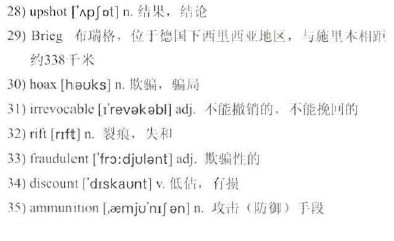
Perhaps there is a sense in which Rosenblat’s stories were a survival technique, a means of dissociating himself from the horrific experiences he underwent and of creating a new, happier ending for his own narrative. But when it became clear that Rosenblat’s supposedly harmless anecdotes were spiraling into something more worrying, there was a growing consensus that it was time to speak out. According to Waltzer: “There was a real fear that Herman Rosenblat would be adding a 33)fraudulent written record to Holocaust history. That would 34)discount the quality of other, true memoirs. And that would give further 35)ammunition to Holocaust-deniers. ”
也许,有人觉得罗森布拉特的谎言是一种求生存的方式,是一种让自己脱离过去的恐怖经历并为自己的故事创造一个更快乐的新结局的方法。但是,当罗森布拉特那段本来无伤大雅的奇闻轶事逐渐演变成某种令人担忧的谎言时,大家的共识就会越来越强烈,认为是时候说出真相了。如沃尔兹所说:“人们真的很担心赫尔曼•罗森布拉特会给大屠杀的历史添上一笔具有欺骗性的书面记录。这样会有损其他真实的自传作品的品质。而且还会给否认大屠杀的那些人更多反驳的有力证据。”
